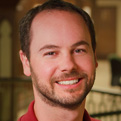
What's Hot in the City?
The Earth is changing in unprecedented ways. This course introduces the characteristics and interrelationships of the Earth's climates, landforms, soils, and natural vegetation, with special emphasis on human relationships with their environment. The subject matter is particularly relevant to current social and scientific interest in global climate change and the spatial inequalities in environmental pollution and resources that benefit some communities and disadvantage others. The material is global in scale, though we will illustrate the concepts using local examples from campus and the city of Richmond.
-
Coursework Overview
The coursework for this Endeavor community involves taking a one-unit course in the fall semester and a half-unit course in the spring semester, both taught by Dr. Lookingbill.
Fall 2024 Semester
Spring 2025 Semester
GEOG 250: Planet Earth: Wind, Water, Fire (1 unit)
IDST 190: What’s Hot in the City Seminar (.5 unit)
GEOG 250 satisfies a general education requirement for natural science inquiry, as well as a required course for prospective Geography majors and Environmental Studies majors.
IDST 190 is a half-unit project based course part of the Endeavor program.
-
Specific Course Information
GEOG 250: Planet Earth: Wind, Water, Fire
Basic concepts of earth systems science and physical geography. Topics include: introduction to mapping, GIS and remote sensing; weather and climate; drought, floods, and environmental hydrology; earthquakes, volcanos, landforms and geomorphology; and the interactions of all of the above with humans and the earth’s biota. Climate change and the spatial inequalities in environmental pollution and resources are emphasized.
IDST 190: What’s Hot in the City Seminar
How can society create and sustain thriving, equitable environments in modern cities? Students will hear firsthand from local environmental leaders and learn about recent environmental initiatives in Richmond like RVAH2O and RVAgreen 2050, the City’s ongoing effort to create an equity-centered climate action plan. Students will contribute to these initiatives by gathering new data to map distributions of temperature, air pollution, and water quality in the City as group projects.
-
Faculty Information

Dr. Todd Lookingbill is a Professor of Biology and Geography, and Sustainability.
-
Endeavor Short Course Information
As part of the Endeavor program, you will participate in the popular Endeavor Pre-Orientation program, where you will take a short course led by Dr. Lookingbill.
Short Course Description: URiver
Welcome to Richmond, the River City. Did you know that the James River is less than a half-mile from campus? Or that you can walk to the City’s popular James River Park in thirty minutes? This course will explore the connections between UR and the James. It will illustrate how campus is used as a living laboratory in many UR classes. We will physically follow the path of water onto campus, into the lake, under the Commons, into the campus Eco-corridor, and eventually out to the James River. We will then set-up a network of sensors along this pathway to investigate the different types of movement (people, animals, and material) that make this transit in a 24-hr period.